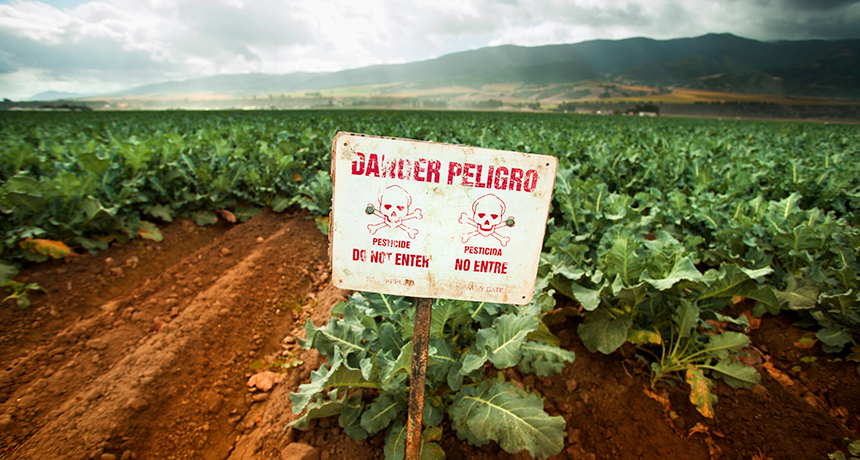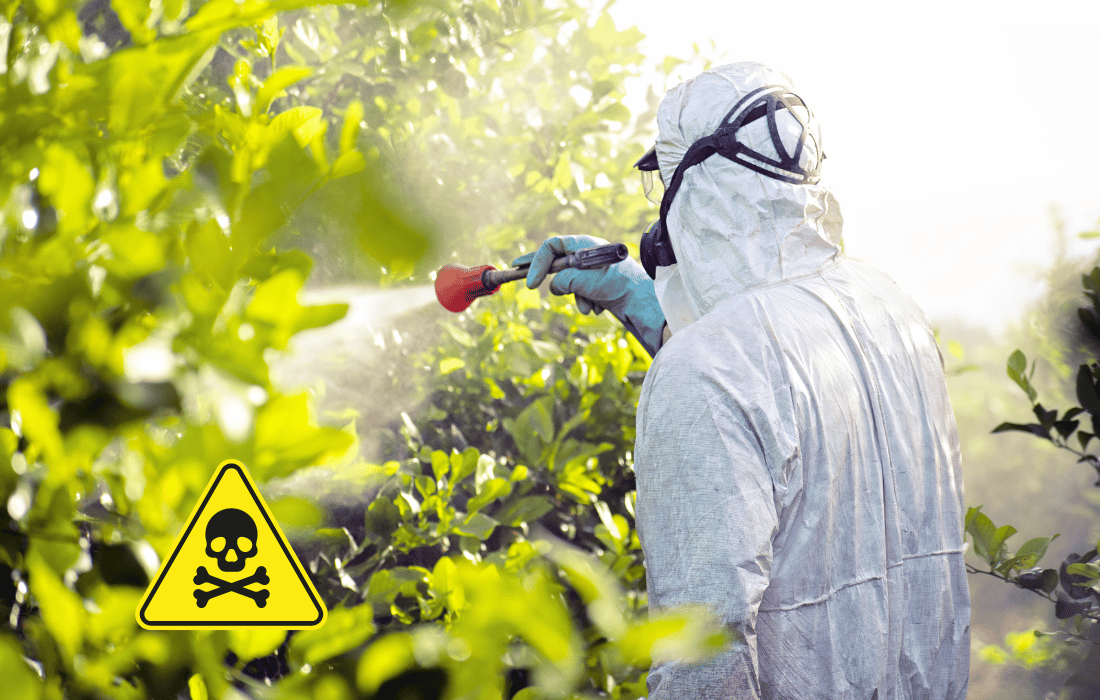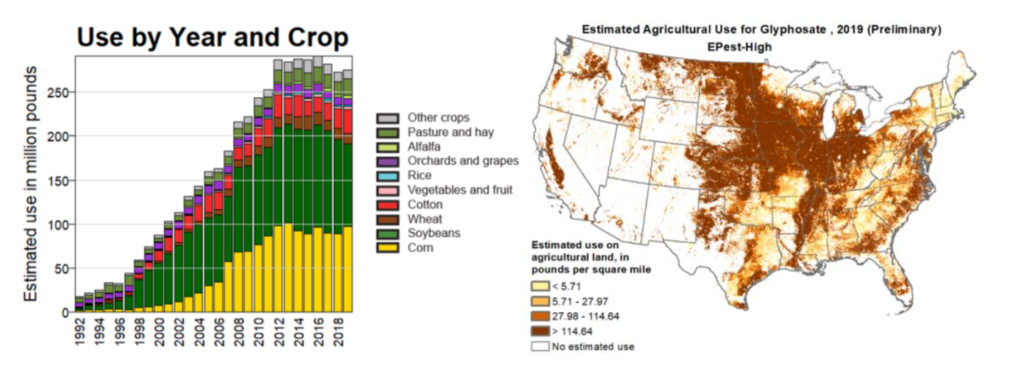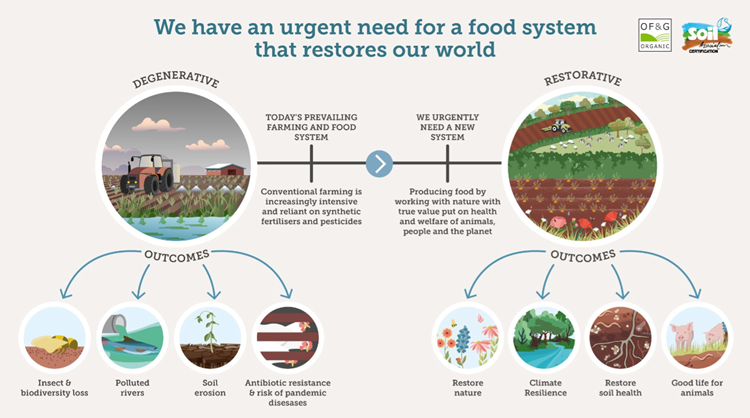Most Americans go about their daily lives without considering the hidden chemicals they might be ingesting with every meal. Pesticides—chemicals designed to kill pests that damage crops—are prevalent in almost every type of food we eat in the United States. While their purpose is to protect crops, these chemicals have the potential to cause serious health issues, including cancer, hormone disruption, neurological disorders, and much more.
The reality is that our agricultural practices in the U.S. prioritize crop yields and pest resistance over human health, leading to the widespread use of dangerous chemicals. These pesticides can accumulate in our bodies, leading to a range of health problems that are often overlooked by conventional medicine.
In this article, we’ll explore the presence of pesticides in our food supply, the health risks associated with exposure, the importance of choosing organic foods, and why growing your own food may be one of the most powerful steps you can take to protect your health.
The Prevalence of Pesticides in the U.S. Food Supply
The United States is one of the largest users of pesticides in the world. According to data from the U.S. Geological Survey, over 1 billion pounds of pesticides are used annually in U.S. agriculture alone. These chemicals are found in almost all conventionally grown produce, with some containing particularly high levels of pesticide residues.
The Environmental Working Group (EWG) has been a key organization in bringing awareness to the pesticide issue. Every year, they release their “Dirty Dozen” and “Clean Fifteen” lists, which identify the fruits and vegetables with the highest and lowest pesticide residues, respectively. These lists serve as a guide for consumers who want to minimize their pesticide exposure by prioritizing which produce to buy organic.

But the problem isn’t just with produce. Pesticides are also present in grains, legumes, nuts, seeds, and even animal products, as animals often consume feed that has been treated with pesticides. This means that even those who don’t eat much fresh produce may still be exposed to significant levels of pesticides through other food sources.
Health Impacts of Pesticides: A Growing Body of Evidence
The health risks associated with pesticide exposure are numerous and well-documented. Pesticides have been linked to a wide range of health problems, including:
Hormone Disruption: Many pesticides are known endocrine disruptors. This means they interfere with the body’s hormonal systems, which can lead to issues like infertility, early puberty, obesity, and thyroid dysfunction. For example, atrazine, a commonly used herbicide, has been shown to disrupt hormone function in animals and is suspected of causing similar effects in humans.
Neurological Disorders: Neurotoxic pesticides, such as organophosphates, are particularly concerning for children. Studies have shown that these chemicals can interfere with brain development, potentially leading to cognitive impairments and behavioral disorders such as ADHD. A study published in Environmental Health Perspectives found that prenatal exposure to organophosphates was associated with lower IQs and memory problems in children.
Cancer: Several pesticides are classified as probable or possible human carcinogens by the International Agency for Research on Cancer (IARC). Glyphosate, the active ingredient in Roundup, is perhaps the most infamous, with numerous studies linking it to non-Hodgkin’s lymphoma and other cancers. A meta-analysis found that agricultural workers exposed to glyphosate had a 41% increased risk of developing non-Hodgkin’s lymphoma.
Autoimmune Diseases: Pesticides can trigger immune system dysfunction, potentially leading to autoimmune diseases like lupus, rheumatoid arthritis, and celiac disease. A study published in Toxicological Sciences found that exposure to certain pesticides increased the risk of developing autoimmune diseases.
Reproductive Health Issues: Pesticides like DDT and its metabolite DDE have been linked to reproductive health problems, including decreased fertility, spontaneous abortions, and developmental defects. Even though DDT has been banned in the U.S. since the 1970s, its residues can still be found in the environment and human tissues due to its persistence and bioaccumulation.
The Dirty Dozen and Clean Fifteen: A Guide to Safer Eating
The EWG’s “Dirty Dozen” list identifies the fruits and vegetables that are most likely to contain high levels of pesticide residues. These are the foods you should prioritize buying organic:
The Dirty Dozen (Highest Pesticide Levels):
- Strawberries: Often contaminated with multiple pesticide residues.
- Spinach: Frequently contains neurotoxic pesticides.
- Kale, Collard, and Mustard Greens: Found to have high levels of Dacthal, a possible carcinogen.
- Peaches: Contain residues of multiple pesticides, including those linked to cancer and reproductive harm.
- Pears: Often treated with pesticides that are endocrine disruptors.
- Nectarines: Like peaches, they are treated with various harmful chemicals.
- Apples: Frequently contain diphenylamine, a chemical banned in Europe due to cancer concerns.
- Grapes: Found to have residues of multiple pesticides.
- Bell and Hot Peppers: Often contain residues of pesticides that are linked to hormone disruption.
- Cherries: Frequently contaminated with harmful pesticides.
- Blueberries: Often contain multiple pesticide residues.
- Green Beans: Found to have high levels of organophosphates and other harmful chemicals.
On the other hand, the “Clean Fifteen” list includes produce that tends to have the lowest levels of pesticide residues, making them safer to buy conventionally:
The Clean Fifteen (Lowest Pesticide Levels):
- Avocados: Have thick skins that protect the fruit from pesticide exposure.
- Sweet Corn: Generally contains low levels of pesticide residues.
- Pineapples: The tough skin helps keep pesticides out.
- Onions: Have low pesticide residue levels due to their natural pest resistance.
- Papayas: Generally have low levels of pesticide contamination.
- Sweet Peas (Frozen): Typically have low pesticide residues.
- Asparagus: Naturally resistant to pests, so they require fewer pesticides.
- Honeydew Melon: The thick rind protects the fruit from pesticide exposure.
- Kiwi: The skin acts as a barrier to pesticides.
- Cabbage: Generally low in pesticide residues.
- Mushrooms: Cultivated indoors, so they are less likely to be contaminated with pesticides.
- Mangoes: The skin protects the fruit from pesticide residues.
- Sweet Potatoes: Have low pesticide residue levels.
- Watermelon: The thick rind keeps pesticides out.
- Carrots: Generally low in pesticide contamination.
Glyphosate: A Carcinogen in Our Food Supply
Glyphosate, the active ingredient in the herbicide Roundup, is one of the most widely used pesticides in the world. It’s applied to crops like corn, soy, and wheat, as well as many other fruits and vegetables. The problem? Glyphosate doesn’t just kill weeds—it accumulates in the food we eat, the water we drink, and even the air we breathe.
Despite the World Health Organization’s classification of glyphosate as a probable human carcinogen in 2015, it continues to be used extensively in U.S. agriculture. A study published in JAMA found that the amount of glyphosate detected in human urine has increased by 500% since the introduction of genetically modified glyphosate-resistant crops in the mid-1990s.
The implications of this are staggering. Glyphosate has been linked to a variety of health issues beyond cancer, including liver and kidney damage, reproductive issues, and endocrine disruption. Moreover, recent studies suggest that glyphosate may also have a negative impact on the gut microbiome, which is crucial for overall health.
One of the most troubling aspects of glyphosate is its persistence in the environment. Even if you stop eating foods contaminated with glyphosate, it can still be found in the air, water, and soil, meaning it’s almost impossible to avoid entirely. This makes the case for choosing organic foods even stronger, as organic farming methods do not permit the use of glyphosate or other synthetic pesticides.
The Criminality Behind U.S. Agricultural Practices
The way pesticides are regulated (or rather, under-regulated) in the United States is deeply concerning. Unlike in the European Union, where stricter pesticide regulations are in place, the U.S. allows the use of many chemicals that have been banned elsewhere. This includes glyphosate, as well as a host of other pesticides that are known to cause cancer, reproductive harm, and neurological damage.
Moreover, many of the studies used to determine the safety of these chemicals are funded by the very companies that produce them, leading to significant conflicts of interest. The revolving door between regulatory agencies like the Environmental Protection Agency (EPA) and agricultural industry giants further undermines public trust in the safety of our food supply.
The recent legal battles against Monsanto (now owned by Bayer), the maker of Roundup, highlight the criminality of these practices. Thousands of lawsuits have been filed against the company by individuals who developed non-Hodgkin’s lymphoma after using glyphosate. Despite this, the chemical remains a staple in U.S. agriculture, raising serious questions about whose interests are being protected—corporate profits or public health?
Why Organic Matters: Local, Sustainable, and Healthier
Choosing organic food is one of the most effective ways to reduce your exposure to harmful pesticides. Organic farming prohibits the use of synthetic pesticides, herbicides, and fertilizers, relying instead on natural methods to protect crops. This not only results in food that is free from dangerous chemicals but also supports a more sustainable and environmentally friendly form of agriculture.
Studies have shown that organic produce contains significantly lower levels of pesticide residues than conventionally grown produce. Additionally, organic foods tend to have higher levels of beneficial nutrients, such as antioxidants, vitamins, and minerals.
One study found that switching to an organic diet for just five days could reduce pesticide levels in the body by as much as 60%. This study highlights just how quickly our bodies can begin to heal when we eliminate pesticide-contaminated foods from our diet.
Support Local Farmers
While choosing organic is crucial, sourcing locally grown organic produce can further enhance the benefits. Locally grown produce is typically fresher, as it doesn’t have to travel long distances to reach your plate. Fresher produce retains more nutrients and tastes better, providing both health and culinary benefits.
Local organic farms also support the local economy and promote sustainable agricultural practices. By purchasing from local farmers, you can have more transparency about how your food is grown, ensuring that it meets the highest quality and sustainability standards.
Growing Your Own Food: A Path to Food Independence
For those who want to take it a step further, growing your own food is one of the best ways to ensure what you’re eating is organic and chemical-free. Even if you don’t have a large yard, you can grow herbs, tomatoes, lettuce, and other vegetables in containers on a balcony or windowsill.
Gardening also reconnects us with nature, offering a deep sense of satisfaction from knowing exactly where your food comes from. Moreover, homegrown produce is often more nutrient-rich than what you can buy at the store, as you can harvest it at peak ripeness.
If you’re new to gardening, start small. Begin with herbs or a few easy-to-grow vegetables like tomatoes or lettuce. As you gain more experience, you can expand your garden and grow a wider variety of produce. There are many resources available online and in local communities to help you get started.
Regenerative Organic Farming: A Solution to the Crisis
Industrial agriculture is not only harming our health, but it’s also devastating the environment. Pesticide use, monocropping, and synthetic fertilizers have depleted our soil, killed biodiversity, and increased greenhouse gas emissions. Regenerative organic farming offers a solution to these problems by focusing on restoring soil health, promoting biodiversity, and reducing our reliance on chemical inputs.
Regenerative farming practices include crop rotation, cover cropping, composting, and reduced tillage. These methods help sequester carbon in the soil, reduce greenhouse gas emissions, and increase the resilience of crops to pests and diseases.
One of the key benefits of regenerative farming is that it builds healthy soil, which in turn produces healthier plants. This results in food that is more nutrient-dense, meaning it contains higher levels of vitamins, minerals, and antioxidants. Additionally, regenerative farming reduces the need for synthetic pesticides, as healthy soil and diverse ecosystems naturally protect crops from pests.
Taking Action: How You Can Make a Difference
Choosing organic foods and supporting local farmers is just the beginning. Here are some practical ways you can make a difference:
- Prioritize the Dirty Dozen: Always buy the organic version of high-pesticide produce like strawberries, spinach, and apples.
- Support Local, Organic Farmers: Farmers’ markets and CSAs are excellent ways to ensure your food is fresh and chemical-free.
- Grow Your Own Food: Even a small garden can provide fresh, pesticide-free vegetables.
- Spread Awareness: Educate others about the dangers of pesticides and the importance of organic food. Sharing articles and studies can help spread the word.
Conclusion
Pesticides in our food supply are a silent health threat, linked to everything from cancer to neurological disorders. While government regulations continue to fall short, we can take matters into our own hands by choosing organic, supporting local farmers, and growing our own food. By making informed choices, we not only protect our health but also contribute to a more sustainable and just food system.
In a different post, Organic Diet: 5 Days to Halve Your Blood Pesticide Levels, I highlighted how quickly you can lower pesticide exposure by switching to organic foods. That simple shift underscores why this conversation is so critical. Pesticides might be part of the current agricultural system, but they don’t have to be part of your life. Choose organic, grow your own food, and take control of what goes into your body—because health is our most valuable asset.










